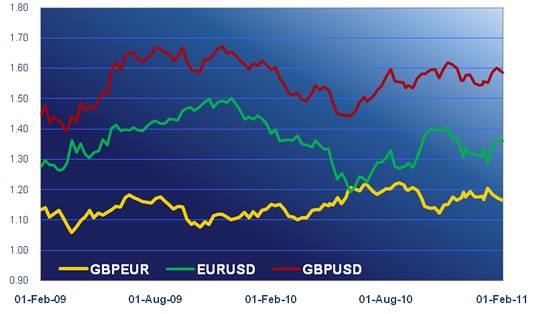The prime minister is working tirelessly to help the UK economy return to growth and full employment. Under his wing this week is the arms industry. Mr Cameron has stolen a march on the French, lending his support to a sales mission to the new regime in Cairo, which is far nicer and less despotic than the previous one. During his tour of the Middle East the PM will not be visiting Bahrain. He doesn’t need to, having already telephoned the king on Sunday to offer him a fantastic deal on protest-busting tanks and cheap rubber bullets.
| Technical levels | |||||||||||||
|
|||||||||||||
| Economic releases | |||||||||||||
|
|||||||||||||
Investors seem at last to be falling in with the idea that the overthrow of dictators is not necessarily good news in the short term. Reliable news from Libya is in short supply but there is a consensus that Gadaffi’s mercenaries are not averse to a bit of mayhem when the mood takes them. If the scorched earth policy gets out of hand it could have a negative impact on oil supplies from one of the world’s biggest producers. There is still no major flight to safety but equity markets around the world took a pace to the rear yesterday as oil prices jumped and Brent crude traded up to $108.
Complicating the situation is a dilemma about which currencies offer the safest haven. Ratings agency Moody’s muddied the waters for the yen when it changed its outlook on Japan’s AA2 rating from stable to negative. Existing misgivings about the United States prevented a headlong rush into the dollar. Unfinished business in Portugal stopped investors going for the euro even after another executive board member, Juergen Stark, repeated his colleague’s comment that “we are prepared to act decisively and immediately if needed” to keep inflation in check by raising interest rates. The Swiss franc is a strong contender for genuine safe-haven status but yesterday, at least, it only managed to beat the Great British pound by a scant half cent.
The commodity dollars are not on the list at all. High oil prices are theoretically good for the Canadian dollar but not, apparently, when there is nervousness about the wider global economy. It is down by a cent against sterling on the day, as is the Australian dollar. The New Zealand dollar suffered its own especially tragic misfortune when an earthquake hit Christchurch, the second one in six months. The Kiwi fell by two per cent against the US dollar on the news, with a third of that loss coming almost immediately at midnight. Local analysts lowered their forecast for first quarter NZ gross domestic product growth from about 0.8% to zero and cut back their estimation of interest rate increases by the Reserve Bank this year from 75 basis points to 25 basis points. Interestingly, news of the NZ earthquake took the US dollar half a cent higher against the pound and the euro and thoroughly confused the yen, which spiked briefly lower. It is worth noting that the Kiwi’s reaction to this earthquake has been very different to the previous one on 3 September last year, which had no real effect on the currency.
Monday’s ecostats went through on the nod, with IFO’s survey of German business sentiment and the Euroland purchasing managers’ indices all coming in ahead of forecast. Released so far this morning are a slight improvement in German consumer confidence, a slight deterioration in Switzerland’s consumption indicator and a widening of the Swiss trade surplus from 1.25 billion to 1.6 billion francs.
Lined up for the rest of the day are Canadian retail sales, Case-Shiller’s US house price index, the Richmond Fed’s manufacturing index and the Conference Board’s reading of US consumer confidence. Britain’s sole contribution is January’s figure for public sector net borrowing. Economists are optimistically forecasting a net repayment which, if it transpires, ought to be good for the pound.






